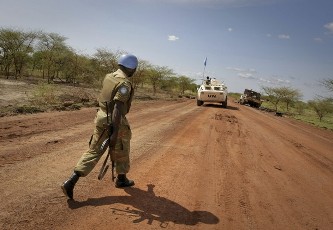Abyei: Leaders give pre-conditions for joint administration with Sudan
January 10, 2013 (JUBA/KHARTOUM) – A Senior official from Abyei on Wednesday demanded that Sudan immediately withdraws its troops from the contested region and stop Messeriya nomads from settling there before for an interim administration can be formed in the area.
The Abyei Joint Oversight Committee (AJOC) will meet in Addis Ababa on Saturday to establish the interim Administration and local legislative assembly, Al-Khair Al Fahim announced in Khartoum on Thursday.
Al-Fahim who co-chairs AJOC with Luka Biong, further said he met with the latter in Abyei on Wednesday 9 January and they agreed to implement the outcome of the presidential meeting between presidents Omer Al-Bashir and Salva Kiir on 5 January.
The two leaders agreed to constitute the administration; the local parliament and the joint police service.

“We are once again alerting the international community, especially the African Union, the Inter-Governmental Authority on Development [IGAD] member countries, the security council of the United Nations, the regional groups and indeed [the] global community at large that Sudanese armed forces continue to occupy Abyei,” said Mijak, in a statement on the state-owned South Sudan Television (SSTV).
“This is unacceptable”, he added.
South Sudan President Salva Kiir, in November last year, directed the formation of an interim administration of Abyei, earmarked to comprise of one representative from the Dinka Ngok tribe as chair of the executive committee, while a representative from the Misseriya tribe would become the speaker of the Abyei parliament.
The agreement on the Abyei interim administration was signed on 20 June 2011, but a divergence over the person who will chair the legislative council delayed the process, as Juba was demanding that Khartoum appoints a Nogk Dinka in this position.
Juba several months ago accepted the AUPSC decision to hold the referendum in October of this year and to form an Abyei administration. However, Sudan rejected the proposal because it excludes the Misseriya nomads. Instead, Khartoum opted for the previous AU proposition, which suggested that Abyei be divided between north and south.
Mijak also insisted that the presence of some members of the Sudanese Armed Forces (SAF) in Abyei is likely to “traumatise” victims in the area, making the planned formation of a joint administration practically impossible.
“We are making it clear that there will be no joint administration with the government of Sudan when its armed forces are still in Abyei area. They are encouraging members of armed Misseriya to move into the area. We are told members of the Misseriya tribe are actually holding guns which itself is a violation of the mandate of the United Nations interim force for Abyei,” the official said.
The UN Interim Security Forces for Abyei (UNISFA), he stressed, remains the only recognised force in the disputed region, as per the agreement reached between the Sudan and South Sudan.
The Abyei referendum was originally due to take place simultaneously to South Sudan’s own independence vote in January 2011. The disagreement over the Misseriya participation froze the process.
Pagan Amum, South Sudan’s lead negotiator at the AU-mediated talks with Sudan on Monday confirmed that last week’s presidential summit in the Ethiopian capital failed to reach any agreement on the final status of Abyei.
The two leaders, according to the AU High Level Implementation Panel (AUHIP), expressed their commitments to respect and implement all the agreements reached on 27 September 2012.
However, Amum expressed discontentment with the outcome of the summit, saying it has failed to resolve the final status of Abyei, but acknowledged that the two leaders agreed to meet again after the formation of an interim administration in disputed oil-producing region.
The next presidential meeting on Abyei, according to the AU communiqué issued after last week’s summit, will be conditional on the formation of the Abyei council and administration, and the preparation by mediators of a ‘matrix’ on implementation of existing agreements.
(ST)
